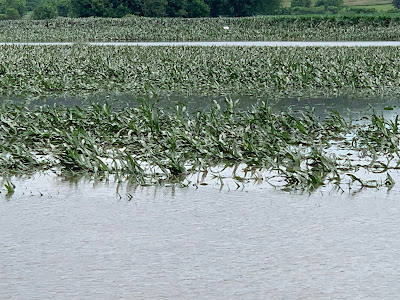 |
| A corn field ruined by flooding near Cambridge, Vermont, photographed on July 12, 2023. Vermont farmers are still contending with the aftermath and damage of last year's devastating floods. |
Silt still in many farm fields, with landowners unsure how to remove it.
Corn fields from last summer remain unharvested due to mud, silt, and pollutants in the wrecked, unusable crops. Many farmers have to test their fields for pollutants before they can grow any new crops.
Some farmers kept get hitting. Rathke highlights one central Vermont farm:
"Dog River Farm, in Berlin, Vermont lost nearly all of its produce crops in the July flooding. The farm removed truckloads of river silt and sand from the fields before another round of flooding in December washed away more precious soils, wiped out the farm's garlic planted in late fall and left behind more oil and several giant holes in a field, said owner George Cross...
'We had 15,000 garlic heads - bulbs growing here which is a significant amount of retail dollars,' he said, pointing to a section of field. 'And now they are gone. They're somewhere down along the Winooski (River)'"
Silt and sand piled up in drifts in floodplain cropland by the disasters of last year are an especially difficult dilemma. You can't dump it back into rivers. You can't pile it up like a dike along the river bank, as that causes environmental harm and might ultimately worsen future floods.
The sand and silt has to be hauled away, somewhere. The farmers have to pay to have that work done. If the sand and silt are not removed, there will be no crops on the affected fields this year.
A grassroots fundraising campaign called Dig Deep Vermont announced Wednesday that it's giving out its first grants to 32 farms to help with some of those expenses. It estimated farms suffered around $45 million in losses statewide from the flooding, extreme weather and persistent rains.
Dig Deep Vermont is still accepting donations, by the way.
Perhaps more than almost anyone else, Vermont farmers are understandably spooked by what kind of weather this growing season will bring. With climate change, storms have gotten worse, and extremes have gotten more extreme.
Last year, even farmers who suffered no flood losses had a rough go of it. The season started with a devastating freeze that ruined apple and other fruit crops, and disrupted wineries across the state. The summer proved so wet that it was hard to harvest hay.
That's all bad for farmers. Still, not every growing season will be a mess. Let's do a toast and hope this year brings nothing but perfect farming weather to the Green Mountain State.

No comments:
Post a Comment